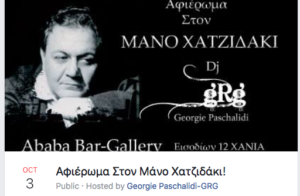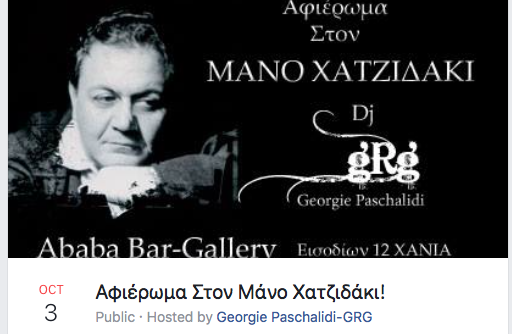Tribute to Mankos Hatzidakis – Chania 3rd October
WHERE: Adabar Bar & Gallery – Ababa Bar, Eisodio 12, Chania
WHEN: 3rd October 20.00
About Manos Hatzidakis (Hadjidakis)
 Emmanuel (Manos) Hadjidakis (Xanthi, October 23, 1925 – Athens, June 15, 1994) was one of the most important Greek composers.
Emmanuel (Manos) Hadjidakis (Xanthi, October 23, 1925 – Athens, June 15, 1994) was one of the most important Greek composers.
His work is thought to be connected with folk music and includes dozens of recordings many of which are now recognized as classical.
Manos Hadjidakis was born in Xanthi, the son of lawyer Georgios Hadjidakis, from Mythios Agios Vassilios Rethymnon and Aliki Arvanitidou.
According to him, he inherited from his mother “all the puzzles I have for a child and up to this day I’m trying to solve them.Without her puzzles I wouldn’t be a poet … “.
His music education starts at the age of four and includes piano lessons from the Armenian pianist Altuyan.He also practices violin and accordion.
After the separation of his parents Hatzidakis finally settled in Athens in 1932, with his mother.
A few years later, in 1938, his father died in a plane crash, which in combination with the onset of the Second World War brought great financial difficulties to the family and forced Hadjidakis to work from a very young age.
At the same time, he expanded his musical knowledge by attending higher theoretical lessons with Menelaos Palandios from 1940 to 1943, while he also began studying Philosophy at the University of Athens, but he would not complete it.
At the same time he associated with other artists and intellectuals, including Nikos Gatsos, the poets Giorgos Seferis, Odysseas Elytis, Angelos Sikelianos and painter Yiannis Tsarouchis.
During the last period of Occupation, he participated in the National Resistance through the lines of EPON under the pseudonym Petros Granitis.
Manos Hadjidakis also wrote texts, children’s poems and songs, which were published in New Generation magazine and in other EPON publications.
After the Liberation, he wrote the hymn “EPON, EPON, you are the enemy of the fascists, the pride of the people of Epon”.
Hatzidakis’ first appearance as a composer takes place in 1944 with his participation in Alexos Solomos’ Last Asprokorakas, at the Art Theater of Karolos Koun.
His collaboration with the Art Theater lasted for about fifteen years, with music for a significant number of works of modern theater.
In 1946 he recorded his first work for the cinema, in the film “Udoluti Sklavoi” and in the following years he composed music for many Greek or foreign films.
Especially for the music for the film The River (1959) he won the musical award of the Thessaloniki Festival.
In 1950 he became a founding member and the artistic director of the Greek Dance Hall of Rallis Manos, presenting his four ballets, Marsyas (1950), Six Folk Paintings (1951), The Cursed Serpent (1951) and Erimia (1958).
Marika Kotopouli also assigns the composition of the music for the Beasts (1950) of Aeschylus. to Hadjidakis
This is the beginning of Hatzidakis’ occupation with many ancient tragedies and comedies, including Medea (1956), Cyclops (1959), Baches (1962), Ecclesiasus (1956), Lysistratis (1957) The Birds (1959).
At the same time, Hatzidakis also collaborates with Angelos Sikelianos to compose music for his latest Hippocratic tragedy.
In 1961 he was awarded the Oscar for the song “The Children of Piraeus” ( film Never on Sunday), which is included in the ten most commercial songs of the 20th century.
Hadjidakis himself, however, thinks his light music for the cinema imparts an “undesirable popularity” that he does not accept and reaches the point of renouncing much of it.
An important time for Hadjidakis for the theater is still the performance Dream Street (1962), directed by Alexis Solomos and starring Dimitris Horn.
In the period 1963-1966 he directs the “Experimental Orchestra of Athens” – of which he was the founder – and within a the short time he gives 20 concerts, with first presentations of fifteen works by Greek composers.
In 1966, Manos Hadjidakis visits America in order to bring his theatrical adaptation of Never on Sunday with the title Illya Darling to the Broadway (with Jules Dassin and Melina Mercouri).
During his stay in America, he is in contact with the American pop and rock music scene, resulting in the recording of the song cycle Reflections in collaboration with the New York Rock and Roll Ensemble.
Source: Georgie Paschalidi


